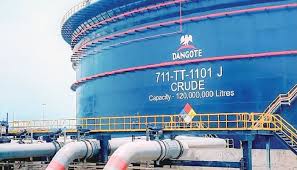Dangote Refinery Set Sails: A Game-Changer For African Fuel Markets
"Dangote Refinery Sets Sails: A Game-Changer for West African Fuel Markets"
By Achimi Muktar
In a bold move set to disrupt the West African fuel market, the Dangote Petroleum Refinery has commenced exporting refined petroleum products to neighboring countries. This milestone signals a new chapter in regional trade, with potential ripple effects for economies reliant on imported fuel.
According to a report by Bloomberg, verified by data from Vortexa, Kpler, and other tracking platforms, a tanker named CL Jane Austen recently loaded over 300,000 barrels of gasoline from the Dangote Refinery. The shipment, now floating off the coast of Togo, is an early indicator of the refinery’s growing influence on West Africa's energy dynamics.
Ghana Eyes Cost Cuts with Dangote Fuel
Ghana, a nation spending approximately $400 million monthly on fuel imports from Europe, is among the first to express interest in sourcing refined products from Dangote. Speaking at the OTL Africa Downstream Oil Conference in Lagos, the chairman of Ghana’s National Petroleum Authority, Mustapha Abdul-Hamid, emphasized the potential for significant cost savings.
"If the refinery reaches 650,000 barrels per day capacity, all that volume cannot be consumed by Nigeria alone. Instead of importing from Rotterdam, it will be much easier for us to import from Nigeria, which I believe will bring down prices," Abdul-Hamid said.
Cheaper freight costs and proximity to Nigeria promise to make Dangote a viable alternative to European suppliers, potentially reducing prices of fuel and other goods across Ghana.
Fuel Exports Gain Momentum
Dangote’s influence is not confined to Ghana. The PUNCH recently reported that the refinery is in advanced talks to export fuel to South Africa, Angola, and Namibia, while initial negotiations are underway with Niger, Chad, Burkina Faso, and the Central African Republic.
"I can confirm to you that talks are actually at the advanced stage with Ghana, Angola, Namibia, and South Africa, while the initial discussion is coming up with Niger, Chad, Burkina Faso, and the Central African Republic," a reliable source revealed.
This growing interest from African nations highlights the refinery’s capacity to cater to regional demand while easing dependence on distant markets like Europe and the US.
Ship-to-Ship Transfers: Fueling Regional Reach
The tanker carrying Dangote’s shipment is currently stationed off Lomé, a hub for ship-to-ship transfers. While the cargo’s final destination remains uncertain, this logistical move hints at a broader strategy to distribute fuel efficiently across the region.
Although the current shipment is relatively small compared to global standards, it signifies the refinery’s operational ramp-up and its ambition to export gasoline on a larger scale.
A Shake-Up for Domestic and Regional Markets
The refinery’s first seaborne gasoline cargo was shipped to Lagos last month, marking the beginning of its domestic operations. However, whether significant volumes will be exported remains to be seen, as Nigeria continues to import fuel from Europe and the US to meet local demand.
Notably, the Federal Government has ended the state-owned oil company’s monopoly on purchasing fuel from the Dangote plant for domestic use, paving the way for more competitive dynamics in the local market.
A Catalyst for Transformation
The Dangote Petroleum Refinery’s emergence as a fuel exporter could redefine the energy landscape in West Africa. By reducing the region’s reliance on distant suppliers, it promises economic benefits for importing nations and potential market shifts for global players.
With its ambitious 650,000 barrels-per-day capacity, the refinery stands poised to become a cornerstone of Africa’s energy independence—one shipment at a time.





















